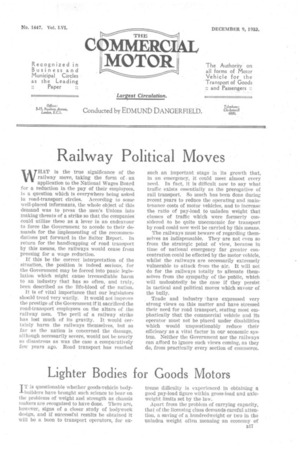Railway Political Moves
Page 31

If you've noticed an error in this article please click here to report it so we can fix it.
WHAT is the true significance of the railway move, taking the form of an application to the National Wages Board for a reduction in the pay of their employees, is a question which is everywhere being asked in road-transport circles. According to some well-placed informants, the whole object of this demand was to press the men's Unions into making threats of a strike so that the companies could utilize these as a lever in an endeavour to force the Government to accede to their demands for the implementing of the recommendations put forward in the Salter Report. In return for the handicapping of road transport by this means, the railways would cease from pressing for a wage reduction.
If this be the correct interpretation of the situation, the position is indeed serious, for the Government may be forced into panic legislation which might cause irremediable harm to an industry that has so often, and truly, been described as the fife-blood of the nation.
It is of vital importance that our legislators should tread very warily. It would not improve the prestige of the Government if it sacrificed the road-transport employees on the altars of the railway men. The peril of a railway strike has lost much of its gravity. It would certainly harm the railways themselves, but so far as the nation is concerned the damage, although necessarily severe, would not be nearly so disastrous as was the case a comparatively few years ago. Road transport has reached such. an important stage in its growth that, in an emergency, it could meet almost every need. In fact, it is difficult now to say what traffic exists essentially as the prerogative of rail transport. So much has been done during recent years to reduce the operating and maintenance costs of motor vehicles, and to increase the ratio of pay-load to unladen weight that classes of traffic which were formerly considered -to be quite uneconomic for transport by road could now well be carried by this means.
The railways must beware of regarding themselves as indispensable. They are not even so from the strategic point of view, because in time of national emergency far greater concentration could be effected by the motor vehicle, whilst the railways are necessarily extremely vulnerable to attack from the air. It will not do for the railways totally to alienate themselves from the sympathy of the public, which will undoubtedly be the case if they persist in tactical and political moves which savour of the bully.
, Trade and industry have expressed very strong views on this matter and have stressed their need for road transport, stating most emphatically that the commercial vehicle and its operator must not be placed under disabilities which would unquestionably reduce their efficiency as a vital factor in our economic system. Neither the Government nor the railways can afford to ignore such views coming, as they do, from practically every section of commerce.




























































































